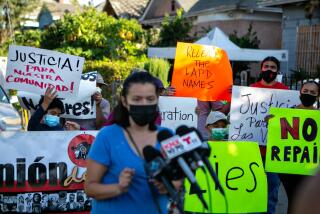Fireworks Industry Propels Economy in Rural China
- Share via
HUANGMAO, China — Zhou Xiaorong was helping to build a new fireworks factory when he heard a boom from his nearby village. It was the sound of yet another tragedy for the industry. The epicenter was literally in the 28-year-old peasant’s backyard.
Zhou lived next door to another fireworks factory, the biggest in the area. The explosion at the business in late December leveled homes and uprooted trees. Even miles away, ceilings crumbled and windows shattered. People screamed. Livestock ran amok.
Zhou’s new two-story home collapsed, killing his 10-year-old son, Peng.
“He was watching TV,” said the young father as he stood in the wreckage of his home long after the blast, despair evident in his eyes. “When I pulled him out, he was still holding the remote control.”
The deadly nature of the fireworks industry in China made headlines last March when dozens of children were killed in a schoolhouse blast. The students had been forced to assemble firecrackers to supplement the institution’s meager income. The incident prompted Premier Zhu Rongji to issue an apology to the nation, promising to guard against such tragedies.
December’s explosion at the Panda Export Fireworks Co. here in Wanzai County, part of Jiangxi province, was particularly embarrassing because it occurred only a half-hour drive from the site of the school tragedy.
In response, provincial authorities announced that they will eliminate fireworks production in Jiangxi within the next two years. Neighboring Hunan province, also famous for its fireworks, came close to doing the same, temporarily closing 170 producers after a Jan. 10 blast killed six people.
Like the rash of mining accidents that have rocked China in recent months, the fireworks blasts have been embarrassing to Beijing. They have brought attention to a dangerous and poorly regulated industry at a time when the national government is preparing for a major leadership change this fall, including the selection of a new president.
A severe cutback in production here in the heart of China’s fireworks country, however, would have lasting impact on the destitute peasants who are economically dependent on jobs making recreational explosives. It also would touch millions of Americans who are among the biggest buyers of China’s ancient noisemakers.
Even after the Panda factory exploded and burned to the ground, one could see signs here of the booming trade: Purple Rain, Cracker Bomb, Whistling Cuckoo, Fire Stick Torch and TNT Killer Bee. All the labels were in English.
Global demand has made pyrotechnics an irresistibly profitable business in China. This nation, which invented fireworks more than a millennium ago, has become the world’s leading producer and exporter in part because other countries cannot compete with its low labor costs and find manufacturing too dangerous.
But people in other nations sure love to buy the fireworks. China exported about $250 million worth last year to dozens of countries. About 95% of the consumer fireworks sold in the United States are manufactured in China. Fireworks usage in America jumped from 29 million pounds in 1976 to more than 152 million pounds in 2000, according to the American Pyrotechnics Assn.
The retail fireworks industry in the U.S. earned an estimated $650 million last year, up from $425 million in 1998, according to the association. With China offering unbeatable prices, retailers can mark up their products 200% to 600% and still sell at an attractive price.
Most developed countries have pulled out of the manufacturing end because of safety concerns. Instead, they concentrate on marketing and distribution.
“If it’s impossible to get products out of China it would severely impact the U.S. market,” said John Rogers, head of the American Fireworks Standards Laboratory, which helps certify imported fireworks. “China has virtually been our sole source of product for at least the last 20 years. There is no other country that could produce this quantity at this point.”
Part of Chinese fireworks’ rising popularity in the States, industry experts say, reflects the improved safety of the final products. But they admit that much less attention is paid to safety standards at the manufacturing end.
In China’s vast countryside, labor is abundant. Plenty of people need jobs, and fireworks make a welcome cash cow. They are low-tech and cheap to produce by hand. The process calls for little more sophistication than it did centuries ago.
An illegal cottage industry flourishes alongside accredited factories. People work at homes and schools, stringing strands of firecrackers or stuffing gunpowder into shells. They do this with little safety equipment.
More than a third of all fires reported last year in China were linked to fireworks production. Officials shut down more than 237,000 illegal factories and shops in 2001, according to state media. But the industry thrives.
It’s better to die in an explosion than from hunger, goes one saying in this region. So much is riding on the industry that few here can imagine life without it.
“Of course we don’t hate our boss,” said a woman who was off-duty during the Dec. 30 explosion at the Panda factory. “He’s making money so we can make money,” she said, giving only her last name, Liu, as she and some neighbors sifted through the rubble of their former work stations, looking for scrap.
Chinese peasants, on average, make less than $300 a year. But here in impoverished Jiangxi province, they helped produce about $179 million worth of pyrotechnics as part of an industry that contributes about $42 million to the provincial coffers through taxes, according to state media.
No wonder locals say there are three paths to wealth: selling drugs, arms or fireworks.
In Wanzai County alone, there are over 300 sanctioned factories making more than 3,000 varieties of fireworks. Taxes on their businesses make up as much as 40% of the local government’s budget.
New factories spring up all the time. They stand out, usually as clusters of small brick sheds with pointed black shingle roofs and no windows. Many of them operate next to homes and schools. The only apparent precautions often consist of signs on the walls: “Sparks Prohibited” and “Safety First.”
Villagers said the Panda factory erected a stone Buddha to protect workers. The blast blew off its head.
At least 1 in 4 Wanzai residents works in the trade, according to locals and media accounts. Most are women. They earn between $37 and $61 a month, depending on overtime.
“We cannot afford to abandon this business,” said a factory owner here named Zhou, who would not give his first name and was not related to the boy killed in the blast. “If you don’t let them make it legally, they will do it illegally. That will be even more dangerous.”
Annual revenue at the Panda factory was about $700,000, according to Zhou. Its tax payments made up as much as half of Huangmao township’s budget.
That, some villagers say, may be why officials insisted that only 14 people were killed in the blast and 61 injured.
“It’s impossible only 14 people died,” said Pan Baocheng, 24, a resident of Yongan, one of four villages near the Panda factory. “At least 10 people died in my village alone, and hundreds more are wounded. That’s not including people killed at the factory.”
Some villagers also questioned the official account that Pan Xiaohua, an employee not related to the Yongan resident, blew up the factory by packing the explosives “too forcefully.”
According to relatives, the 35-year-old mother of two was not packing smaller backyard fireworks. Instead, she was assembling the more powerful pyrotechnics used in public displays. Critics of the industry suspect that lax management and improper use of chemicals contributed to the blast.
The dead woman’s dilapidated hut sits about a five-minute walk from the blast site. The explosion sent tiles flying from its roof and rocks falling from the sky. Her father was hit on the face and back. The family dog, which was nursing five puppies, was struck on the mouth and leg.
Villagers in the area argue that the factory should not have been built in such a densely populated place. But protests against the business before it opened in the early 1990s were broken up by local authorities, several villagers said.
“Of course we’re scared to live here, but we have no choice, we were here first,” said Zhu Wansheng, 72, who lives next door to the house in Huangmao that collapsed on the boy. Only the door frame at the entry to Zhu’s home still stands. The family sleeps under a plastic tarp.
Next door, Zhou Xiaorong has buried his son and erected a tent in the family’s dried wheat field to shelter the family.
“This will be a very sad new year,” said Zhou Huihong, 20, the boy’s uncle. “I’ve never seen anything like it.”
More to Read
Sign up for Essential California
The most important California stories and recommendations in your inbox every morning.
You may occasionally receive promotional content from the Los Angeles Times.












